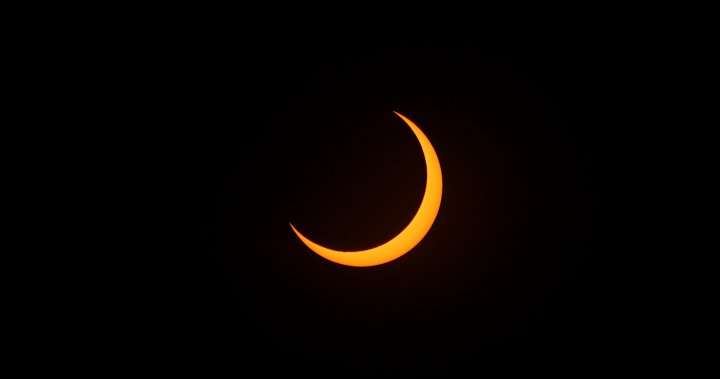Millions of Canadians living in the eastern portion of the nation will experience a once-in-a-lifetime event in person with the total solar eclipse.
Monday’s event will play out across dozens of communities, with cities in the path of totality expected to see a large influx of eclipse watchers.
However, for those who live elsewhere in the country and aren’t able to be in those communities on Monday, how can they watch the total solar eclipse?
Here is what you need to know.
Global News to livestream the total solar eclipse
Globalnews.ca will be live streaming the total solar eclipse as it moves across North America on Monday afternoon.
Global News live online coverage will include NASA footage of the event, featuring cities in the eclipse’s path including Dallas, Texas, Cleveland, Ohio and Mazatlán, Mexico.

Once the eclipse hits Niagara Falls, Ont., Global News will be live on location where a state of emergency has already been declared. The border town is expecting close to a million visitors on Monday for the once-in-a-lifetime event.
The email you need for the day’s
top news stories from Canada and around the world.
Coverage begins on Globalnews.ca and the Global News YouTube channel at 1 p.m. eastern.
Also, Global’s 24/7 live national stream will carry the latest updates of the event, including a live shot of the eclipse and on-the-ground coverage. It can be found here and on the Global TV app.
Niagara Falls is one of a few cities and towns included in the path of totality, which includes parts of Quebec, New Brunswick, Prince Edward Island, Nova Scotia, and Newfoundland and Labrador, as well as several regions in the U.S. and Mexico.
Cities and towns outside the path of totality but nearby will see a partial solar eclipse.
Depending on your location, the solar eclipse will take place in the afternoon or early evening.
In Canada, the start time of the total solar eclipse is 3:12 p.m. ET and the path of totality ends at 4:16 p.m. ET, according to timeanddate.com
A partial eclipse will be visible in the country between 1:40 p.m. ET and 5:18 p.m. ET.
How to listen to the total solar eclipse
For those who can’t physically watch the total solar eclipse, a San Francisco-based museum of science, technology and the arts has created something to accommodate them.
The Exploratorium will be running a live sonification of the total solar eclipse on its website.
A sonification, it explains, is used to convey information.
“In this case, it expresses how much light is coming from the sun. A sonification is also an auditory work of art — a musical composition created in real time using data streamed from Exploratorium video crews as they film the eclipse,” the Exploratorium said on its website.
“By pre-assigning a note or sound to every possible data value and running the data through a software program, a musical representation of the phenomenon is produced, with melodies and harmonies determined by the data.”

Furthermore, the LightSound Project will also be hosting a livestream of the total solar eclipse from 2 to 4 p.m. eastern.
Started in 2017, a team of U.S. astronomers and academics created LightSound as a tool for the blind and low vision community to experience a solar eclipse with sound.
It says on its website the team has been working to build more than 750 devices to be distributed at no-cost to groups hosting eclipse events this year.
— with files from Saba Aziz
© 2024 Global News, a division of Corus Entertainment Inc.





